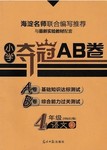题目内容
B. some works
C. many works
D. a lot of work

 小学夺冠AB卷系列答案
小学夺冠AB卷系列答案It was the last night of my summer camp. 16 I didn’t want to leave, I had to go back home the next day. I didn’t want to pack (收拾行装). I just wanted to make the night go 17 . How I wished that I could make time 18 at that moment! However, it seemed that time flew more quickly than before. I 19 on the bed, but I wasn’t 20 at all. I just closed my 21 , thinking of every minute I had 22 with my friends during the camp.
Just then, someone 23 the door. “Open the door, please.” said a soft 24 . I thought it was my friend, Elle. So I replied, “It’s open.” Then the door 25 . When I looked at the door, I was 26 . There stood all my friends, Elle, Lily, Sally and Allie. Together they walked over to my 27 and then each of them gave me a big hug (拥抱). We 28 our phone numbers and e-mail addresses to each other. We said that no matter how far we would be away from each other, we would 29 forget each other.
Just then, a tear slowly rolled down my face. As I looked up, I noticed all of my friends’ eyes were also 30 .
|
1. |
|
|
2. |
|
|
3. |
|
|
4. |
|
|
5. |
|
|
6. |
|
|
7. |
|
|
8. |
|
|
9. |
|
|
10. |
|
|
11. |
|
|
12. |
|
|
13. |
|
|
14. |
|
|
15. |
|
 e
to try different dishes at each meal. So I had to throw away a lot of food
because the bowls were too big. But now the dining hall offers small sizes.
It’s great because I can try different dishes at half price and don’t waste so
much food,” said Fan Peng, a student from Nanjing University.
e
to try different dishes at each meal. So I had to throw away a lot of food
because the bowls were too big. But now the dining hall offers small sizes.
It’s great because I can try different dishes at half price and don’t waste so
much food,” said Fan Peng, a student from Nanjing University.